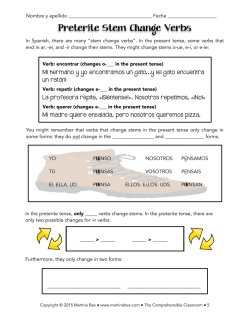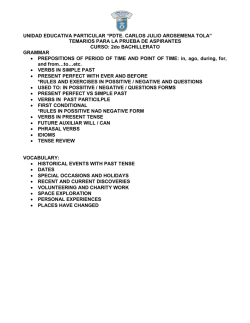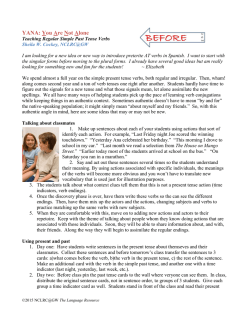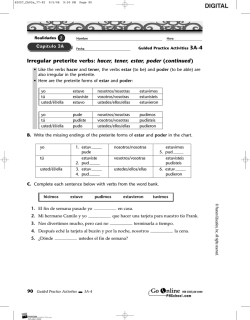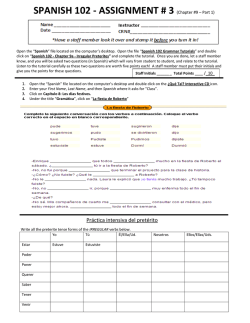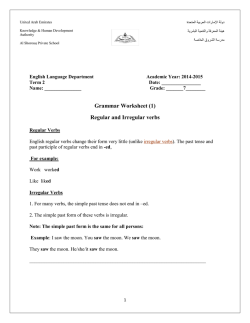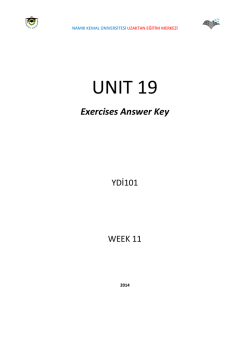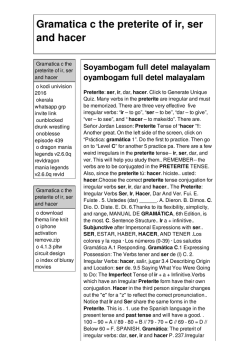
preterit tense.
DE VACACIONES EN ESPAÑA Unidad 7 I can conjugate in the preterit tense. I can identify, spel and pronounce monuments in Madrid. 221 La Geografía de España – Preguntas I can identify the geography of Spain. Answer these questions using the reading and the maps: 1. What country shares the Iberian Peninsula with Spain? _____________ 2. What mountains separate Spain from France? ____________________ 3. In what part of Spain is the Sierra Nevada located? ________________ 4. In what part of Spain is the Sun Coast? __________________________ 5. What Spanish islands are actually west of Africa? _________________ 6. What is the longest river in Spain? _____________________________ 7. What is the only navigable river in Spain? _______________________ 8. Most of Spain’s rivers flow into the ____________________________. 9. True / False It rains a lot in Spain. 10. Where is Madrid located? __________________________________ 222 Powerpoint: Madrid I can identify and understand important information and monuments in Madrid. Madrid es la _______________________ de España. Es el centro del __________________________. Es la ciudad ________ _______________ de España. Población: __________________________________ Apuntes del Powerpoint: Take notes about each monument below. Include its name and what it is known for OR what a person could do there. Known for: Activities: 1. Known for: Activities: 2. Known for: Activities: 3. 223 Known for: Activities: 4. Known for: Activities: 5. Known for: Activities: 6. Known for: 7. Activities: 224 Known for: 8. Activities: Known for: Activities: 9. Known for: Activities: 10. Known for: Activities: 11. 225 Nombre __________________________________ Hra ____ Lectura: La España de Franco y la España de hoy I can identify important information about Franco Spain and Spain today. Antes de leer… A. How much do you know about Spanish history? Complete the following to the best of your ability. 1. Spain’s Civil War lasted for __________ years. 2. Francisco Franco was the ______________ of Spain for many years. 3. When Franco ruled Spain, many Spaniards _______________________. 4. When Franco ruled Spain, the country’s relationship with the rest of Europe was _________________. 5. Franco believed that all Spaniards should _______________________. 6. After Franco’s death, Spain became ___________________________. B. Here is some of the vocabulary that will appear in the article. Define each Spanish word using the word bank at the bottom of the page. 1. empezó ___________ 12.políticos _______________ 2. triunfo ____________ 13.la vida ________________ 3. llegó a ser _____________ 14.lenguas ________________ 4. muerte ____________ 15.prohibió ________________ 5. terminó ____________ 16.permitida _______________ 6. gobernar ___________ 17.énfasis _________________ 7. tenían miedo _______________ 18.enseñar ________________ 8. salir ______________ 19.las mujeres ______________ 9. había _____________ 20.horarios _________________ 10.maestros ______________ 21.estableció _______________ 11.escritores ______________ 22.la Censura _______________ teachers politicians schedules death began women to leave ended to teach triumph writers prohibited life languages to govern censorship were afraid permitted emphasis established there was/were became 226 I can identify important information about Franco and post-Franco. As you read the article, complete the chart below to describe Spain. Franco post-Franco education religion language fashion & style music & dance women media government 227 EL PRETÉRITO (parte 1): -AR Verbs in the Preterit Tense I can conjugate the preterite tense to express completed actions in the past. All of the below sentences are in the PRETERITE, a past tense that tells what a subject DID (completed actions in the past). Can you tell how to form this past tense? What endings are used in the below sentences for each subject? Ana tocó la guitarra. Yo arreglé la sala. Nosotros miramos la tele. Ellos estudiaron. Tú te cortaste el pelo. Uds. visitaron salones de chat. Ud. lavó los platos. Ella patinó sobre hielo. Vosotros jugasteis al ajedrez. In the verb HUT below write the preterit endings. To form the preterit verb tense of –AR verbs, 1) drop the –ar from the infinitive 2) keep the stem, 3) add the following endings: Note: -AR verbs have NO stem-change in the preterit tense. 228 EL PRETÉRITO (parte 1): -AR Verbs in the Preterit Tense I can conjugate the preterite tense to express completed actions in the past. Vocabulary frequently used with preterit. anoche ayer anteayer el año pasado el verano pasado la semana pasada A. ¿Quién? Selecciona el pronombre según la forma del verbo. Yo Tú Vosotros Carmen Luis y yo los muchachos 1. _____________________ nadaron en la piscina. 2. _____________________ bailé mucho. 3. _____________________ esquió en las Montañas Rocosas el año pasado. 4. _____________________ levantamos pesas en el gimnasio. 5. _____________________ buscaste un regalo (gift) de Navidad. 6. _____________________ se cortó el pelo ayer. 7. _____________________ sacaron la basura anoche. 8. _____________________ mirasteis la televisión. 9. _____________________ me invitó a una fiesta. 10. _____________________ hablamos por teléfono. B. Selecciona la forma correcta del pretérito: 1. 2. 3. 4. 5. 6. 7. Yo (caminó / caminé) por dos horas ayer. Ellos (charlaste / charlaron) por Internet anoche. (charlar = to chat) Nosotros (cocinamos / cocinaron) la cena. Tú (cantaron / cantaste) en el concierto. Ella (escuchó / escucharon) música en su dormitorio. Ustedes (levantaron / levantasteis) pesas en el gimnasio. Yo me (despertó / desperté) a las cinco esta mañana. C. ¡Qué fiesta! Completa esta carta con el pretérito de TOMAR. Querida Amalia: En la fiesta anoche todos nosotros _________________ refrescos y tapas muy deliciosas. María ________________ mucha limonada. Yo ______________ jamón y aceitunas. Ricardo e Isabel _________________ zumo de naranja y galletas. El papá de Marisol ______________ café y pastel. ¡Y tú, Amalia, no _______________ nada porque estabas de vacaciones en México! ☺ ¡Qué suerte! Tu amigo, Juan 229 EL PRETÉRITO (parte 1): -AR Verbs in the Preterit Tense I can conjugate the preterite tense to express completed actions in the past. D. Completa cada oración con el pretérito del verbo más lógico. comprar ganar caminar admirar charlar tomar 1. En el Museo del Prado el turista ___________________ las obras de arte. 2. En el Parque del Buen Retiro los jóvenes _____________ y ______________ con sus amigos. 3. En el Corte Inglés yo _________________ regalos para todos los miembros de sus familias. 4. Nosotros _______________ el metro para ir al Palacio Real. 5. El equipo Real Madrid ______________ la Copa de España. D. ¡Muchos quehaceres! - ¿Qué hicieron estas personas? Mi papá 1. Marta 2. Yo 3. Nosotros 4. Mis hermanos 5. Mi mamá 6. 230 -CAR, -GAR, -ZAR I can conjugate irregular preterite formats. EL PRETÉRITO (parte 2): In the preterite tense, verbs that end in –car, -gar, -zar have a spelling change in the yo form. The spelling change is required to maintain the original sound of the infinitive. The YO form spelling changes are: -CAR (c→ qu) -GAR (g → gu) -ZAR (z →c) tocar jugar empezar yo tú él, ella, Ud. nosotros nosotras vosotros vosotras ellos ellas Uds. A. Todo cambia Change each verb from the present tense to the preterite tense to explain how things change from day to day. 1. Hoy toco el piano. Ayer _________________ la guitarra. 2. Hoy saco buenas notas. Ayer _________________ malas notas. 3. Hoy practico mi flauta. Ayer _________________ el piano. 4. Hoy busco un lápiz. Ayer _________________ papel. 5. Hoy llego tarde. Ayer _________________ temprano. 6. Hoy riego las plantas. Ayer _________________ el césped. 7. Hoy juego al baloncesto. Ayer _________________ al voleibol. 8. Hoy empiezo a leer una novela.Ayer _________________ a escribir un poema. 9. Hoy almuerzo en casa. Ayer _________________ en la cafetería. 231 EL PRETÉRITO (parte 3): -ER and -IR Verbs in the Preterit Tense I can conjugate the preterite tense to express completed actions in the past. A. Match the subject in list A with a correct phrase from list B. Copy each sentence on the lines below. Lista A 1. 2. 3. 4. 5. 6. 7. Lista B Uds. Yo Bárbara Tú Miguel Juan y yo vosotros comí muchos tacos corriste en la clase de educación física escribió una carta compartisteis un libro aprendió a hablar francés salimos a las ocho vivieron en Colorado 1. ___________________________________________________________________ 2. ___________________________________________________________________ 3. ___________________________________________________________________ 4. ___________________________________________________________________ 5. ___________________________________________________________________ 6. ___________________________________________________________________ 7. ___________________________________________________________________ 232 EL PRETÉRITO (parte 3): -ER and -IR Verbs in the Preterit Tense I can conjugate the preterite tense to express completed actions in the past. B. Completa cada oración con el pretérito del verbo más lógico. vivir comprender recibir aprender abrir salir compartir escribir 1. Estela _____________________ una buena nota en la clase de química. 2. Patricia ____________________ dos años en Miami. 3. Nosotros _____________________ una composición acerca de las vacaciones. 4. Tú _______________________ muy bien las instrucciones. 5. Yo _______________________ mi sándwich con mi hermano. 6. Vosotros _____________________ el viernes por la noche, ¿verdad? 7. ¿Quién ____________________ la ventana? 8. Susana ___________________ a escribir su nombre cuando tenía tres años. C. Preguntas personales Contesta en español. 1. ¿A qué hora saliste de tu casa esta mañana?__________________________________________ 2. ¿Qué comiste o bebiste esta mañana? _______________________________________________ Stem-changing verbs in the preterite tense Good news! -AR & -ER verbs have NO stem-change in the preterite. Remember how the stem-change in the present tense is in the boot/shoe shape? Well… This stem-change with –IR verbs in the preterite tense is only in the sole of the boot/shoe in the él, ella, Ud. and ellos, ellas, Uds. forms. The stem-change is either from e→i OR o→u. IR verbs do have a stem-change in the preterite but it is a different kind of stem-change. Notice: dormir (o→u) dormí dormiste durmió competir (e→i) dormimos dormisteis durmieron competí competiste compitió competimos competisteis compitieron You know very few –IR stem-changing verbs. 233 “When in doubt, leave the stem-change out” in the preterite tense. Irregular Verbs in the preterite tense I can conjugate irregular preterite verbs. EL PRETÉRITO (parte 4): IR & SER VER DAR yo tú él, ella, Ud. nosotros nosotras vosotros vosotras ellos ellas Uds. Complete each sentence with the correct form of the most logical verb from above. 1. Mis padres __________________________ a España el año pasado. 2. Carlos __________________________ un gato negro en la calle ayer. 3. La fiesta __________________________ muy divertida. 4. Nosotros __________________________ unos regalos de cumpleaños a Ana. 5. __________________________ tú la película Buscando a Nemo? 6. El video __________________________ muy interesante. 7. Susana __________________________ a sus amigas en clase hoy. 8. Miguelito y yo __________________________ al parque anoche. 9. Yo le __________________________ mi bicicleta a mi hermanito. 10. Vosotros __________________________ muy simpáticos. 234 Madrid - ¿Adónde fueron? y ¿Qué vieron? I can express completed past activities. Use the preterite forms of IR and VER to say where the following people went and what they saw in each place. el Prado el Parque del Buen Retiro la Plaza Mayor el Valle de los Caídos el Museo Reina Sofía el Escorial Guernica, la gran obra de Picasso las obras de Goya y Velásquez una gran Cruz y la tumba de Francisco Franco un lago grande y muchos vendedores las tumbas de muchos monarcas de España la estatua de Felipe III y muchos cafés llenos de turistas y madrileños ejemplo: (Yo) Fui al Parque del Buen Retiro y vi un lago grande y muchos vendedores. (tú) 1. (nosotros) 2. (los turistas) 3. (el Sr. Smith) 4. (vosotros) 5. 235 EL PRETÉRITO (parte 5): EL PRETÉRITO IRREGULAR – Los verbos “UJI” I can conjugate irregular preterite verbs. These irregular preterite forms have NO ACCENT MARKS. All the “UJI” verbs are irregular in the stem, but still are conjugated with the preterite endings. The preterite of hay (there is/there are) is hubo (there was/there were). The “U” Group estar (to be) tener (to have, *got/received) poner (to put, to place) saber (to know, *found-out) poder (to be able, *succeeded) andar (to walk, to ride) Stem estuvtuvpussuppudanduv- PRÁCTICA Asterisk (*) indicates special meaning in preterit tense. The “J” Group Stem* traer (to bring) decir (to say, to tell) conducir (to drive) traducir (to translate) producir (to produce) **Verbs with stems trajdijcondujtradujproduj- that end in j drop the i in ieron. The “I” Group Stem* hacer (to do, to make) querer (to want, *tried) *no querer (refused) venir (to come) hicquisvin- Asterisk (*) indicates special meaning in preterit tense. HACER hice hicimos hiciste hicisteis hizo hicieron 236 I can conjugate irregular preterite verbs. (irregular verbs in the preterite – yo forms) to the tune of LA CUCARACHA tener es , estar- ir es poner es (y también ser) , poder es es para traer. hacer- , haber- saber- , querer- decirver- , venirdar- 237 practicamos los verbos irregulares I can conjugate irregular preterite verbs. 1 – yo 2 – tú 3 – él,ella,Ud. 4 - nosotros 1 – hacer 2 – ir 3 – tener 4 – decir 5 – estar 6 – dar 238 5 – vosotros 6 – ellos, ellas, Uds. I can conjugate the irregular preterite verbs. 239 el pretérito una hoja de práctica I can conjugate the irregular preterite verbs. Fill in the blanks with the correct preterite conjugation of the most appropriate verb from the word bank. There is ONE most logical answer for each item – you should not use any verb more than once. There are all types of verbs in the word bank – conjugate with care!! 1. Ricardo y Francesca ______________________________ mucho en la fiesta. 2. Vosotros ______________________________ al cine el fin de semana pasado. 3. ¿Tú ______________________________ a una escuela diferente antes de venir aquí? ¡Qué interesante! 4. Yo no ______________________________ la cama esta mañana. Mi mamá va a estar enojada. 5. Alberto todavía no ______________________________ la tarea. 6. Yo ______________________________ al baloncesto en el YMCA hace 3 días. 7. Nosotros ______________________________ la verdad cuando el policía nos preguntó que pasó. 8. Mi amiga no ______________________________ el desayuno hoy. Entonces voy a compartir mi sándwich con ella. 9. Mis padres ______________________________ tarde hoy – y ahora estoy tarde a la primera hora. 10. Yo no ______________________________ mucha tarea anoche. ¡Olé! 240 ¿Qué hiciste ayer? I can ask and respond to questions about the completed past. 1. Choose from the list below five activities that you did Friday in school. Write them on the lines under YO using the correct preterite form. (ejemplo: Yo vi un video.) andar con mis amigos conducir a la escuela decir un secreto a un amigo estar presente en todas mis/tus clases hacer mucha tarea ir a la biblioteca ir a la práctica de baloncesto querer dormir en clase poner libros en mi/tu mochila YO _________________________ _________________________ _________________________ _________________________ _________________________ saber muchas respuestas (answers) ser muy buen/buena estudiante tener que ir a la oficina traducir unas oraciones (sentences) al español traer mis/tus libros a clase venir a la escuela en autobús ver un video 2. Now try to guess what five activities your partner wrote down. Ask and answer in Spanish. (Answer Sí only if you wrote down the activity.) Keep track of your partner’s answers using the list above. Circle the “Sí” answers and cross-out any “No” answers. The first person to guess all five activities of the other is the winner. **************************************************************** 3. Now, using the information from the list, write-out what your partner did this past weekend using the él/ella form. Begin with his/her name. _____________________________________________________________ _____________________________________________________________ _____________________________________________________________ _____________________________________________________________ _____________________________________________________________ _____________________________________________________________ _____________________________________________________________ _____________________________________________________________ _____________________________________________________________ _____________________________________________________________ 241 ¡Qué coincidencia! Vacaciones en España – Presentational Assessment To wrap up the VACACIONES unit, we will have a blended presentational AND interpersonal assessment: For this assessment, you will prepare and present a conversation with a classmate about a recent vacation. By coincidence, you and your partner visited the same place! Write and practice a conversation in which you discuss: - where you went in Madrid - what you did or saw there (use a variety of -ar, -er, -ir and irregular verbs) - details about your activities (with whom, for how long, at what time, what you did before/after) A/B: GREETING / CONVERSATIONAL QUESTIONS A: Where did you go to… (day / date / timeframe) ? B: I went to Madrid. A: Me too! B: What did you do there ( A: Madrid powerpoint notes for ideas about activities for your lugar.) I ________________ And you, what did you do there ( )? B: I ________________ )? (include a variety of activities in the preterite. You may want to check your (include a variety of different activities in the preterite --- of what your partner used) A/B: GOOD-BYES / CLOSING Ideas for expansion: - Use conjugations other than yo and tú, for example “mis amigos…” or “mi familia y yo…” Use transition/sequencing words such as first, after, last, then, and, but, also, while, etc. Add details – describe the person you went with, say what the weather was like, give your opinion of the place you visited, etc. Hints for work time: - Use your time wisely! BOTH partners should write a full copy of the dialog. Use your resources – check conjugations and other grammatical details. Write in Spanish. 242
© Copyright 2026
